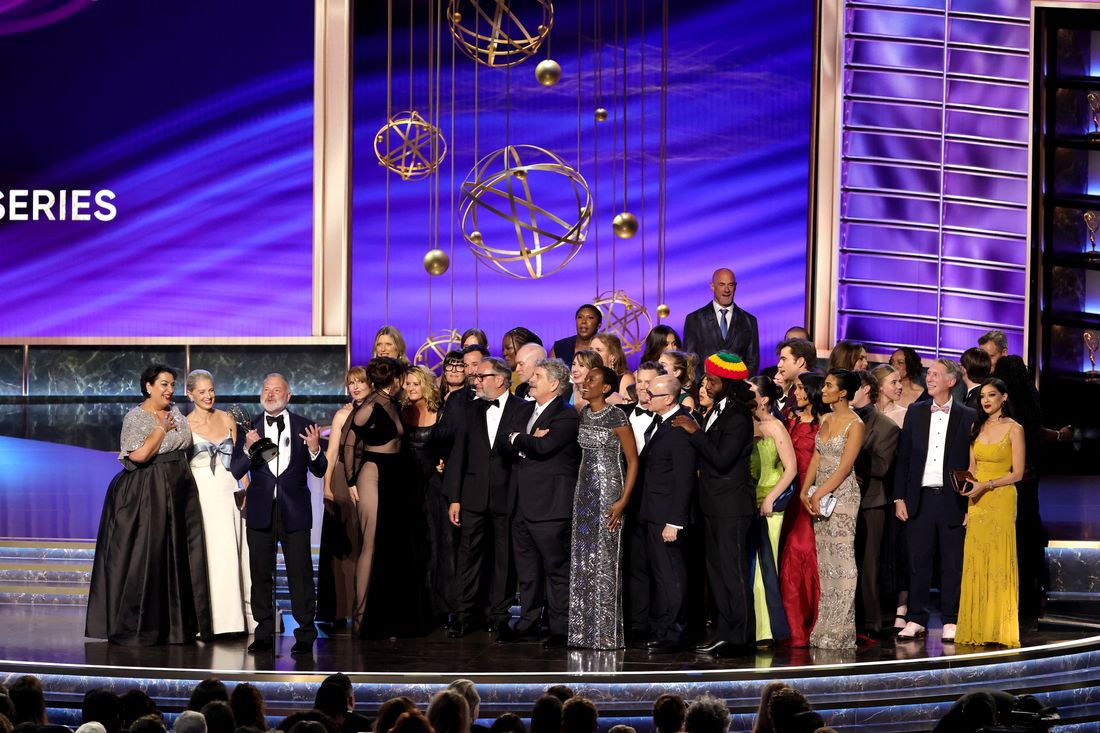
The 77th Primetime Emmy Awards had a bumpy start, with the host constantly rushing winners and the show frequently interrupting the awards with reunions and musical performances. It took a while for a clear picture of the current state of television to emerge. Ultimately, HBO Max’s *The Pitt* became the night’s biggest winner, unexpectedly beating *Severance* to win both Best Actor (for Noah Wyle) and Best Drama Series. This prevented Apple TV+ from having a historic night – *The Studio* did win Outstanding Comedy Series – and signaled that traditional, procedural-style dramas still have a place in the streaming era. *The Pitt’s* win feels like a vote for streaming shows that resemble the network dramas of the past.
While the night wasn’t a complete victory for any single show, *The Pitt* won three awards – for Drama Series, Best Actor, and Supporting Actress (a surprise win for Katherine LaNasa). *Severance* also did well with two acting wins, recognizing Tramell Tillman and Britt Lower (who beat out favorite Kathy Bates). The directing and writing awards were split, with *Slow Horses* winning for directing and *Andor* unexpectedly taking the writing award. However, despite leading with 27 nominations overall, *Severance* losing the top Drama Series award suggests voters were hesitant to name it the best. Though ambitious and impressive, *Severance* sometimes feels slow-paced, with storylines and characters circling until only a few major events happen each season.
What makes *The Pitt* stand out is its consistent stream of patient and character-driven crises, ensuring the story always feels engaging. The rise of serialized TV, seen in shows like *Lost*, *The Sopranos*, *Breaking Bad*, *Game of Thrones*, and *Succession*, influenced many of today’s nominated dramas-including *Severance*, *The White Lotus*, and *The Last of Us*. These shows typically have a strong creative vision, focus on a central storyline, and run for shorter seasons. *The Pitt*, however, deliberately echoes the style of *ER*, offering more self-contained episodes and a longer season (15 episodes compared to 7 for *The Last of Us* and 8 for *The White Lotus*). In an industry where job security is a concern, voting for *The Pitt* feels like supporting a sustainable model, especially considering its use of local Los Angeles talent.
The Emmys felt like a year of change. Long-standing favorites were either missing or didn’t perform as well as usual – shows like *The Last of Us* and *The Bear* received fewer nominations, and *The White Lotus* didn’t win any top prizes for the first time in three years. This created room for some genuinely surprising wins. Jeff Hiller’s victory for Supporting Actor in a Comedy for *Somebody Somewhere* was a particularly satisfying moment, proving that voters sometimes recognize true excellence.
It seemed like CBS wasn’t fully invested in the Emmys, but the voters themselves were determined to honor great television. The wins for actors like Hiller, Lower, Tillman, and LaNasa felt like a deliberate break from simply rewarding the usual suspects. The Emmys can be predictable, often repeating the same winners, and while Jean Smart is undeniably talented, a fourth Emmy for *Hacks* felt a little repetitive. However, this pattern was mostly avoided this year. It would have been a letdown if Ebon Moss-Bachrach had won another Emmy instead of Hiller, or if *The White Lotus* had swept the Supporting Actress category again. The choice between *Severance* and *The Pitt* forced voters to consider something new, as both shows would have been first-time winners. Ultimately, by choosing *The Pitt* as the best drama, the Emmy voters revealed the type of television they most value.
Read More
- All Golden Ball Locations in Yakuza Kiwami 3 & Dark Ties
- Gold Rate Forecast
- Hollywood is using “bounty hunters” to track AI companies misusing IP
- What time is the Single’s Inferno Season 5 reunion on Netflix?
- Mario Tennis Fever Review: Game, Set, Match
- NBA 2K26 Season 5 Adds College Themed Content
- A Knight Of The Seven Kingdoms Season 1 Finale Song: ‘Sixteen Tons’ Explained
- Train Dreams Is an Argument Against Complicity
- Every Death In The Night Agent Season 3 Explained
- 2026 Upcoming Games Release Schedule
2025-09-15 08:57